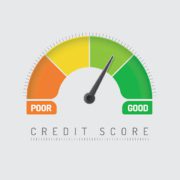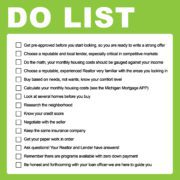Tips that Make Getting a Mortgage a Breeze in 2019
Tip #1: Start early. One of the most important mortgage tips you should know before you get started is to understand all of your financial details. This makes the mortgage process go much more smoothly and eliminates surprises throughout the process.
Tip #2: Check your credit report for errors. Review your credit report to ensure that there are no errors such as incorrect addresses, phone numbers, names or accounts that show up. Your mortgage lender can give you the most detailed credit overview. There are multiple online sources that will provide a free credit report as well.
 Tip #3: Work with a qualified lender before making repairs to your credit score on your own. A professional will consult you so that you don’t end up inadvertently lowering your score by trying to repair it on your own.
Tip #3: Work with a qualified lender before making repairs to your credit score on your own. A professional will consult you so that you don’t end up inadvertently lowering your score by trying to repair it on your own.
Tip #4: You can avoid private mortgage insurance if you have 20 percent down. If you do not have 20 percent down, there are multiple loan programs available that require a lower down payment. Your credit score and other variables come into play, so it’s not a one-size-fits-all process.
Tip #5: Make sure you can afford the payment comfortably. Most mortgages have a debt-to-income (DTI) ratio requirement. The DTI is the amount of monthly debt payments you have compared to your monthly income. Most mortgages will allow a maximum DTI of 41 percent; however, this number is not the same for every borrower nor for every loan. Ideally, you want to be comfortable and not stretch yourself too thin so you still have cash on reserve.
Tip #6: Know the right kind of loan for your unique situation. There are multiple loan options available. With conventional, FHA, rural development, VA, doctor loans and MSHDA options, as well as the streamlined 203(k) program, there are numerous nuances and options available to meet every borrower’s unique situation. Make sure you work with a knowledgeable loan officer that will take the time to educate you.
Tip #7: Have your documents ready so you don’t slow down the loan process. The mortgage process requires a great amount of paperwork, so having as much documentation beforehand can save time and energy. A loan officer will need to verify your income, tax documents, employment and a slew of other things.
Here is a checklist of some of the documents you may need (not all will apply to your unique situation).
- Bank statements
- Tax returns from the previous two years
- W2s from past and current employers
- Pay stubs
- A list of your debts
- A list of your assets
- A gift letter if you’re using gift funds
- Proof of timely rental payments
- Credit Report
- Profit and loss statements
- Signed purchase agreement
- Proof of additional income
- Divorce decree
- Bankruptcy paperwork
Depending on the loan and your credit history, you may need additional documentation not listed above. To better understand the process and be the most prepared, reach out to your trusted loan officer. We’re always here to help.












Leave a Reply
Want to join the discussion?Feel free to contribute!